Liberty Records was founded in 1955 by Simon Waronker in Hollywood, California. Si was born in 1915
in a poor section of Los Angeles. When he was five, his father started him playing the violin. He was a
child prodigy, starting high school at eleven and graduating at thirteen. Si got a scholarship to study
violin in Philadelphia and then France. He ended up in Germany during the rise of Hitler. After barely
escaping from a Nazi youth gang that was pursuing him because he was Jewish, he returned to the
United States. Back in Los Angeles, he worked for 20th Century Fox from 1939 until 1955, playing
musical scores for movies.
In 1955, his cousin, Herb Newman, called and suggested they go into the record business. After much
thought and discussions with Alfred and Lionel Newman at 20th Century Fox, Si Waronker gave up his
highly paid job to start a record company. By this time Si made up his mind, however, Herb Newman
had backed out of the deal and formed his own record company called Era, so Waronker was on his
own. The first releases on the label were lush orchestral recordings by Lionel Newman. If you look at
the first 100 or so album releases on Liberty, you can see that Si Waronker was recording the music he
new best: big band music, movie music, orchestral music and some jazz. The numbering system for the
singles started with the 55000 series, probably just the year the label was established followed by some
zeros, but it ran sequentially for 16 years. The first single (Liberty 55001) was Lionel Newman's
somewhat ironic pairing of "The Girl Upstairs" with "Conquest."
 Waronker contacted jazz artist Bobby Troup in 1955 to try to sign him to the label, but Troup was still
under contract to another record company. Troup, however, talked Si into signing his girlfriend, Julie
London. Julie became the "Liberty Girl" as she immediately had a hit with "Cry Me a River" (Liberty
55006, 1955) and went on to make a string of successful albums for the label. Troup himself did sign
with Liberty a short time later, and recorded a series of albums for Waronker.
Waronker contacted jazz artist Bobby Troup in 1955 to try to sign him to the label, but Troup was still
under contract to another record company. Troup, however, talked Si into signing his girlfriend, Julie
London. Julie became the "Liberty Girl" as she immediately had a hit with "Cry Me a River" (Liberty
55006, 1955) and went on to make a string of successful albums for the label. Troup himself did sign
with Liberty a short time later, and recorded a series of albums for Waronker.
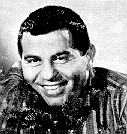 Ross Bagdasarian had been a songwriter of some success (for example, he wrote Rosemary Clooney's
1951 hit "Come On-A My House") when Liberty signed him in 1956. He first recorded under the name
"Alfi and Harry" ("The Trouble With Harry," Liberty 55008, 1956), an artist by-line obviously constructed
for the record itself. His followup single was "The Bold and the Brave"/"See a Teardrop Fall" under his
own name (Liberty 55013), but it disappeared without a trace. A quick reverting to Alfi and Harry
("Persian on Excursion"/"Word Game Song," Liberty 55016) didn't do much either. Seeking a simpler
pseudonym (for obvious reasons), Bagdasarian then recorded the instrumental "Armen's Theme"under
the name David Seville (Liberty 55041, 1956). He soon shifted to novelty records, with a few chart
successes within the next few years such as "Gotta Get to Your House" (Liberty 55079, 1957), "The Bird
On My Head" (Liberty 55140, 1958), "Little Brass Band" (Liberty 55153, 1958), and "Judy" (Liberty
55193, 1959). But these minor hits would have ensured Seville a brief but forgettable career if not for a
bit of innovation that landed him on the top of the charts. In 1958 he got the idea of speeding up the tape
of the human voice to create funny voices, and he had a number one record with the classic "Witch
Doctor" (Liberty 55132). He followed that up with "The Chipmunk Song" in late 1958 (Liberty 55168),
and then a long running series of albums and singles by Chipmunks "Alvin, Simon and Theodore." The
Chipmunks were wryly named for Liberty executives Alvin Bennett, Simon Waronker, and Theodore
Keep. Bagdasarian died in 1972, but his son, Ross, Jr., resurrected the Chipmunks act in the 1980s for a
whole new generation of fans both on record and in cartoons.
Ross Bagdasarian had been a songwriter of some success (for example, he wrote Rosemary Clooney's
1951 hit "Come On-A My House") when Liberty signed him in 1956. He first recorded under the name
"Alfi and Harry" ("The Trouble With Harry," Liberty 55008, 1956), an artist by-line obviously constructed
for the record itself. His followup single was "The Bold and the Brave"/"See a Teardrop Fall" under his
own name (Liberty 55013), but it disappeared without a trace. A quick reverting to Alfi and Harry
("Persian on Excursion"/"Word Game Song," Liberty 55016) didn't do much either. Seeking a simpler
pseudonym (for obvious reasons), Bagdasarian then recorded the instrumental "Armen's Theme"under
the name David Seville (Liberty 55041, 1956). He soon shifted to novelty records, with a few chart
successes within the next few years such as "Gotta Get to Your House" (Liberty 55079, 1957), "The Bird
On My Head" (Liberty 55140, 1958), "Little Brass Band" (Liberty 55153, 1958), and "Judy" (Liberty
55193, 1959). But these minor hits would have ensured Seville a brief but forgettable career if not for a
bit of innovation that landed him on the top of the charts. In 1958 he got the idea of speeding up the tape
of the human voice to create funny voices, and he had a number one record with the classic "Witch
Doctor" (Liberty 55132). He followed that up with "The Chipmunk Song" in late 1958 (Liberty 55168),
and then a long running series of albums and singles by Chipmunks "Alvin, Simon and Theodore." The
Chipmunks were wryly named for Liberty executives Alvin Bennett, Simon Waronker, and Theodore
Keep. Bagdasarian died in 1972, but his son, Ross, Jr., resurrected the Chipmunks act in the 1980s for a
whole new generation of fans both on record and in cartoons.
By 1956, the acts on Liberty still had a decidedly "pop" sound. Sisters Patience and Prudence McIntyre,
then aged 11 and 14, were the daughters of orchestra leader Mack McIntyre, who encouraged them to
record. They had a #4 record with "Tonight You Belong To Me" (Liberty 55022) and followed up with the
#11 "Gonna Get Along Without Ya Now" (Liberty 55040), but six additional singles failed to chart. Big
band veteran Margie Rayburn was signed in 1956, but it wasn't until her fifth single that she dented the
charts with "I'm Available" (Liberty 55102, #7, 1957), and then six more singles were unsuccessful.
Also in 1956, Liberty signed the little-known Henry Mancini to the label. Mancini was then a staff
soundtrack music writer for Universal Studios. Although in the early 1950s, he was providing bits and
pieces of incidental music to various motion pictures, by the mid 'fifties he was doing more and more.
Liberty issued two singles by Mancini using his soundtrack songs, including "Main Theme"/"Cha Cha
Cha for Gia" from Four Girls in Town (Liberty 55045), and "Hot Rod"/"Big Band Rock And Roll"
(Liberty
55060) from Rock Pretty Baby. Mancini also recorded several albums for Liberty, but
unfortunately for
Waronker, Mancini soon became a hot property, and in 1959 moved to RCA, where he became a legend
in the movie music field. Liberty, of course, shamelessly reissued his albums long after his departure.
 The biggest early rock and roll artist for Liberty was Eddie Cochran. Cochran's first hit for the label was
"Sittin' in the Balcony" (Liberty 55056) in 1957, a "cover" or competing copy of a record on a small North
Carolina-based label by fledgling singer-songwriter John D. Loudermilk (recording as "Johnny Dee" on
Colonial 430). The song copied Loudermilk's style, and was not representative of Cochran's usual sound
or style. In fact, in 1957 it was difficult to say Cochran had a "style" at all as yet. He had made some
recordings with (unrelated) Hank Cochran in the rockabilly vein, but it wasn't until a year or so later that
he hit his stride with the rock and roll anthem "Summertime Blues" (Liberty 55144). He followed that up
with the pounding rocker "C'mon Everybody" (Liberty 55144). Such are the material of rock and roll
legends. Then came the dreaded "lull." By the time Cochran was tragically killed in an automobile
accident in England in 1960, he had failed to reach the top 40 for more than a year, although he was still
very popular as a stage act. Ironically, he has become much more popular and collectable since his
death than he ever was in life. Only one album, Singin' To My Baby, was issued on Liberty prior
to his death and it is very collectable. Two albums, Eddie Cochran: 12 of his Biggest Hits and
Never to Be Forgotten, were released after his death.
The biggest early rock and roll artist for Liberty was Eddie Cochran. Cochran's first hit for the label was
"Sittin' in the Balcony" (Liberty 55056) in 1957, a "cover" or competing copy of a record on a small North
Carolina-based label by fledgling singer-songwriter John D. Loudermilk (recording as "Johnny Dee" on
Colonial 430). The song copied Loudermilk's style, and was not representative of Cochran's usual sound
or style. In fact, in 1957 it was difficult to say Cochran had a "style" at all as yet. He had made some
recordings with (unrelated) Hank Cochran in the rockabilly vein, but it wasn't until a year or so later that
he hit his stride with the rock and roll anthem "Summertime Blues" (Liberty 55144). He followed that up
with the pounding rocker "C'mon Everybody" (Liberty 55144). Such are the material of rock and roll
legends. Then came the dreaded "lull." By the time Cochran was tragically killed in an automobile
accident in England in 1960, he had failed to reach the top 40 for more than a year, although he was still
very popular as a stage act. Ironically, he has become much more popular and collectable since his
death than he ever was in life. Only one album, Singin' To My Baby, was issued on Liberty prior
to his death and it is very collectable. Two albums, Eddie Cochran: 12 of his Biggest Hits and
Never to Be Forgotten, were released after his death.
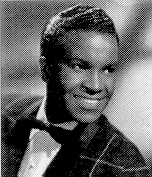 Billy Ward and his Dominoes had long been an R&B fixture when they signed with Liberty in 1957. The
landmark group had started in 1950 with lead singer Clyde McPhatter (Ward on piano), and in 1951 had
achieved the unprecedented feat of having an R&B hit that was so huge that it crossed over into the pop
charts. "Sixty Minute Man" (Federal 12022) spent 14 weeks on top of the R&B charts, and in late
summer, 1951, pushed its way into the pop top 20. When McPhatter left to form his own group, the
Drifters, in 1953, another lead singer of uncommon talent, Jackie Wilson, stepped in. By 1956, Ward's
group were "drifters" themselves, drifting from the harder R&B sound towards the more lush pop sounds
of orchestral music. When they signed in 1957, their previous hit had been "St. Therese of the Roses"
(Decca 29933), which featured Jackie Wilson backed with Jack Pleis' orchestra. At this point, Wilson
opted for rock and roll, and Ward's Dominoes continued toward orchestral pop. Ward hit with old pop
standards "Star Dust" (Liberty 55071, #12 pop, 1957) and "Deep Purple" (Liberty 55099, #20 pop, 1957)
right away, but it was the beginning of the end for the group. Their three Liberty albums, however, are
collectable. Wilson's replacement, Eugene Mumford, also put out several later singles on Liberty.
Billy Ward and his Dominoes had long been an R&B fixture when they signed with Liberty in 1957. The
landmark group had started in 1950 with lead singer Clyde McPhatter (Ward on piano), and in 1951 had
achieved the unprecedented feat of having an R&B hit that was so huge that it crossed over into the pop
charts. "Sixty Minute Man" (Federal 12022) spent 14 weeks on top of the R&B charts, and in late
summer, 1951, pushed its way into the pop top 20. When McPhatter left to form his own group, the
Drifters, in 1953, another lead singer of uncommon talent, Jackie Wilson, stepped in. By 1956, Ward's
group were "drifters" themselves, drifting from the harder R&B sound towards the more lush pop sounds
of orchestral music. When they signed in 1957, their previous hit had been "St. Therese of the Roses"
(Decca 29933), which featured Jackie Wilson backed with Jack Pleis' orchestra. At this point, Wilson
opted for rock and roll, and Ward's Dominoes continued toward orchestral pop. Ward hit with old pop
standards "Star Dust" (Liberty 55071, #12 pop, 1957) and "Deep Purple" (Liberty 55099, #20 pop, 1957)
right away, but it was the beginning of the end for the group. Their three Liberty albums, however, are
collectable. Wilson's replacement, Eugene Mumford, also put out several later singles on Liberty.
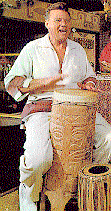 Bandleader Martin Denny came to Liberty in 1957. When Liberty had an unexpected hit with Martin
Denny's "Quiet Village" (Liberty 55162) in 1959, a recording that had all sorts of "jungle sound effects", it
started Liberty on a seemingly endless number of exotic music albums by Denny and others. "Quiet
Village" itself, a remake of the 1952 Les Baxter tune (Capitol 2225), had been recorded in 1957 for an
earlier album (Exotica) in mono, and when the song became a huge hit, Liberty re-recorded it in
stereo for their stereo albums and juke box stereo singles. One of the members of Denny's band, Julius
Wechter, later started the Baja Marimba Band and had a number of hits for Herb Alpert's A&M label in
the
1960s.
Bandleader Martin Denny came to Liberty in 1957. When Liberty had an unexpected hit with Martin
Denny's "Quiet Village" (Liberty 55162) in 1959, a recording that had all sorts of "jungle sound effects", it
started Liberty on a seemingly endless number of exotic music albums by Denny and others. "Quiet
Village" itself, a remake of the 1952 Les Baxter tune (Capitol 2225), had been recorded in 1957 for an
earlier album (Exotica) in mono, and when the song became a huge hit, Liberty re-recorded it in
stereo for their stereo albums and juke box stereo singles. One of the members of Denny's band, Julius
Wechter, later started the Baja Marimba Band and had a number of hits for Herb Alpert's A&M label in
the
1960s.
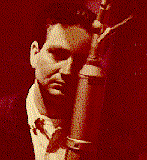 Another interesting, but unsuccessful, artist on Liberty was Texas deejay Willie Nelson. Starting in 1961
with "The Part Where I Cry"/"Mr. Record Man" (Liberty 55386), Nelson wrote songs and occasionally
recorded albums for
Liberty until 1964. His songs from this period have become country standards, including "Hello Walls,"
"Crazy," and "Funny How Time Slips Away." Listening to the Liberty recordings from the present,
however, is somewhat of a shock, as Nelson's voice was fairly clear and lacked the gravel heard in later
years. Whether that made a difference is unknowable, but his singles didn't do much until 1962, when
"Willingly" (Liberty 55403), a duet with Shirley Collie, cracked the Country top-10. A few more country
hits later, he left Liberty for RCA. Although he had a number of hits with RCA in the late 1960s, it wasn't
until the 1970s that Nelson became a superstar in the country field. (A 1958 Liberty single, Liberty
55155, "Susie"/"No Dough" by Willy Nelson, was actually a recording by the cousin of teen idol Ricky
Nelson, not the later country superstar.)
Another interesting, but unsuccessful, artist on Liberty was Texas deejay Willie Nelson. Starting in 1961
with "The Part Where I Cry"/"Mr. Record Man" (Liberty 55386), Nelson wrote songs and occasionally
recorded albums for
Liberty until 1964. His songs from this period have become country standards, including "Hello Walls,"
"Crazy," and "Funny How Time Slips Away." Listening to the Liberty recordings from the present,
however, is somewhat of a shock, as Nelson's voice was fairly clear and lacked the gravel heard in later
years. Whether that made a difference is unknowable, but his singles didn't do much until 1962, when
"Willingly" (Liberty 55403), a duet with Shirley Collie, cracked the Country top-10. A few more country
hits later, he left Liberty for RCA. Although he had a number of hits with RCA in the late 1960s, it wasn't
until the 1970s that Nelson became a superstar in the country field. (A 1958 Liberty single, Liberty
55155, "Susie"/"No Dough" by Willy Nelson, was actually a recording by the cousin of teen idol Ricky
Nelson, not the later country superstar.)
During the 1959-61 period, Liberty also acquired bandleaders Si Zentner, Felix Slatkin, and the
inimitable Spike Jones. Liberty entered the fledgling folk music scene by signing Bud & Travis and later
Jackie DeShannon. In addition to Willie Nelson, their country roster included Floyd Tillman, June Carter,
Ralph Emery, Bob Wills and Tommy Duncan. They also made some deals with smaller labels to
distribute hits that became too big for their original labels to handle. Examples of this are the 1959 #1
"Come Softly to Me" by the Fleetwoods (Liberty 55188 nee Dolphin 1), distributed for the Seattle-based
Dolton label, and the 1961 Troy Shondell hit "This
Time" (Liberty 55353), originally on the Goldcreast (later pressings, Goldcrest) label out of Indiana. The
now-collectable 1959 novelty "Chaos, Parts 1 & 2" by Arbogat & Ross (Liberty 55197) was a one-shot
deal. The marching band tune "National City" by the Joiner, Arkansas Junior High School Band (Liberty
55244) was a fluke hit in 1960, and resulted in Liberty trying several more singles by the band.
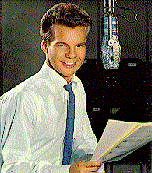 The most consistent hit maker for Liberty in the early 1960s was Bobby Vee (Robert Velline). Vee was
from Fargo North Dakota, and in 1959 was a member of a local group called the Shadows (which
included Bob's brother and two of their friends). On February 3, 1959 when Buddy Holly, the Big Bopper
and Ritchie Valens were killed in a plane crash on their way to Fargo, the Shadows were asked to fill in
at the scheduled show. Contrary to persistent rumors, Bobby and his band did not sing any Buddy Holly
songs that evening out of respect for the late singer, but the audience loved him. Bobby Vee and
the Shadows had been recording for the Minneapolis-based Soma label, and a few months later had a
#1 regional hit with "Suzy Baby" (Soma 1110). Joe Sadd, a Liberty promotion man for the area, sent the
record to Snuff Garrett, who was then a hungry new producer for Liberty looking for talent. Garrett
arranged to buy the master and reissue it on Liberty (Liberty 55208), and to sign Vee to Liberty,
sans the Shadows. In the summer of 1960 he had his first top-10 national hit with "Devil or
Angel" (Liberty 55270), a remake of the 1956 Clovers R&B hit (Atlantic 1083). In July, 1961, he
recorded the Carole King and Gerry Goffin tune "Take Good Care of My Baby" (Liberty 55354), which
made #1. Bobby Vee had a long list of hits into the late 1960s and had over 20 albums issued on
Liberty.
The most consistent hit maker for Liberty in the early 1960s was Bobby Vee (Robert Velline). Vee was
from Fargo North Dakota, and in 1959 was a member of a local group called the Shadows (which
included Bob's brother and two of their friends). On February 3, 1959 when Buddy Holly, the Big Bopper
and Ritchie Valens were killed in a plane crash on their way to Fargo, the Shadows were asked to fill in
at the scheduled show. Contrary to persistent rumors, Bobby and his band did not sing any Buddy Holly
songs that evening out of respect for the late singer, but the audience loved him. Bobby Vee and
the Shadows had been recording for the Minneapolis-based Soma label, and a few months later had a
#1 regional hit with "Suzy Baby" (Soma 1110). Joe Sadd, a Liberty promotion man for the area, sent the
record to Snuff Garrett, who was then a hungry new producer for Liberty looking for talent. Garrett
arranged to buy the master and reissue it on Liberty (Liberty 55208), and to sign Vee to Liberty,
sans the Shadows. In the summer of 1960 he had his first top-10 national hit with "Devil or
Angel" (Liberty 55270), a remake of the 1956 Clovers R&B hit (Atlantic 1083). In July, 1961, he
recorded the Carole King and Gerry Goffin tune "Take Good Care of My Baby" (Liberty 55354), which
made #1. Bobby Vee had a long list of hits into the late 1960s and had over 20 albums issued on
Liberty.
In 1960, Liberty also signed Johnny Burnette. Previously, Burnette had been a member of the "Rock
and Roll Trio" with his brother Dorsey and Paul Burlison. The Rock and Roll Trio made a legendary and
incredibly rare rockabilly album for Coral in 1957, but by the time Johnny Burnette signed with Liberty, he
was a pop singer who had written several hits for Ricky Nelson. Burnette had a handful of hits for
Liberty,
including "Dreamin'" (Liberty 55258), "You're Sixteen" (Liberty 55285), "Little Boy Sad" (Liberty 55298),
"Big, Big World" (Liberty 55318), and "God, Country and My Baby" (Liberty 55379). Burnette also had six
albums issued on Liberty. He drowned in a boating accident in 1964.
Other artists recording for Liberty in the early 1960s included television star Walter Brennan, Gene
McDaniels, Gary Miles, Buddy Knox, Timi Yuro, Vikki Carr, Ernie Freeman, Ed Townsend, Nick Noble,
Gary Paxton (of Skip and Flip and the Hollywood Argyles), Dick and Dee Dee, the Johnny Mann Singers,
Van McCoy, Matt Monro, Billy Strange, the post-Buddy Holly Crickets, Eddie Heywood, the Mar-Kets,
and P.J. Proby. The Rivingtons were a high energy rock and roll/rhythm and blues group whose hits
"Papa Oom Mow Mow" (Liberty 55427, 1962) and "The Bird Is the Word" (Liberty 55553, 1963) became
the basis for the classic by the Trashmen, "Surfin' Bird" (Garrett 4002, 1963), which was essentially a
medley of the two Rivingtons songs with a long and loud drawing of breath in between. Roosevelt Grier,
the ex-footballer who was later a friend of Bobby Kennedy and present when he was shot in 1968, also
made several singles for Liberty.
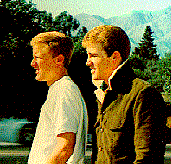 In 1962, Liberty signed Jan and Dean to their first contract with a major record label. They had some
hits dating back to 1958 for Arwin, a label owned by Marty Melcher (Doris Day's husband and Terry
Melcher's father), Herb Newman's Dore label, and Challenge Records. These included "Jennie Lee"
(Arwin 108, by Jan & Arnie, 1958, #8), "Baby Talk" (Dore 522, 1959, #10) and "Heart and Soul"
(Challenge 9111, 1961, #25). Jan and Dean came to Liberty just as surf and hot rod music were gaining
popularity, most successfully by their friends the Beach Boys. Jan and Dean jumped on the craze. In the
summer of 1963, they had a Number 1 hit with "Surf City" (Liberty 55580), written for them by Beach Boy
leader Brian Wilson. They followed up with several car song hits, including "Drag City" (Liberty 55641,
#10), "Dead Man's Curve" (Liberty 55672, #8) and "The Little Old Lady From Pasadena" (Liberty 55704,
#3). The hits spawned successful albums for the label well into 1966. But on April 19, 1966, Jan Berry
was involved in a very serious automobile accident and suffered critical injuries which pretty much ended
the duo's career.
In 1962, Liberty signed Jan and Dean to their first contract with a major record label. They had some
hits dating back to 1958 for Arwin, a label owned by Marty Melcher (Doris Day's husband and Terry
Melcher's father), Herb Newman's Dore label, and Challenge Records. These included "Jennie Lee"
(Arwin 108, by Jan & Arnie, 1958, #8), "Baby Talk" (Dore 522, 1959, #10) and "Heart and Soul"
(Challenge 9111, 1961, #25). Jan and Dean came to Liberty just as surf and hot rod music were gaining
popularity, most successfully by their friends the Beach Boys. Jan and Dean jumped on the craze. In the
summer of 1963, they had a Number 1 hit with "Surf City" (Liberty 55580), written for them by Beach Boy
leader Brian Wilson. They followed up with several car song hits, including "Drag City" (Liberty 55641,
#10), "Dead Man's Curve" (Liberty 55672, #8) and "The Little Old Lady From Pasadena" (Liberty 55704,
#3). The hits spawned successful albums for the label well into 1966. But on April 19, 1966, Jan Berry
was involved in a very serious automobile accident and suffered critical injuries which pretty much ended
the duo's career.
By 1963, the Vice President of Liberty, Al Bennett, was responsible for the business side of things, and
also much of the success of the company. In the 1962-63 time period, Bennett was approached by
Avnet (an electronics company) about buying Liberty. Si Waronker was in poor health, so he and
Bennett agreed to sell the company to Avnet for 12 million dollars. At this point, Si Waronker cashed out
of the company, leaving Bennett in control of day-to-day operations. Surprisingly, Liberty started losing
money after the Avnet sale. After two years in the red, Avnet wanted out. During this period, Avnet
bought out another Los Angeles label, Imperial, which also gave Liberty control of the catalogs of
Aladdin and
Minit. Avnet then sold the whole company, including Imperial, Dolton, Aladdin, and Minit, back to Al
Bennett for eight million dollars!
The discographies of Imperial, Dolton, Aladdin, and Minit are covered on separate pages.
By 1965, Liberty began to augment their roster with some of the talent that would be the mainstay of the
label for the next few years. They signed comedian Jerry Lewis' son Gary Lewis and his group the
Playboys, who proved to be a lot more talented than the dismissal that being a star's son usually
warranted. Other acts like the T-Bones, Gants, Del Shannon, and Ken Dodd (from the UK) all had chart
hits, but most of the chart action for the post-Avnel Liberty was going on at Imperial, which had been
turned into a kind of rock and roll hit machine.
The Sunset label was formed as a budget
subsidiary in 1966, and used to issue albums of previously released Liberty and Imperial material. It
continued until the early 1970s.
In 1968, Transamerica Corporation, an insurance conglomerate, purchased Liberty for 38 million dollars
and combined it with another of their record companies, United Artists. In a story that is repeated over
and over in the record business (compare Avnet), Transamerica did not have a clue about running a
record company. Al Bennett was fired after six months, and the company rapidly declined until by early
1972 the Liberty name had disappeared. Artists such as Bobby Vee, Gary Lewis, and Jan and Dean,
who had been the hot product of the mid '60s, were in decline in the charts, and Transamerica didn't
come up with replacements that they could promote effectively. They shut down Dolton and transferred
Dolton's artists (Ventures, Vic Dana, etc.) to Liberty, then they shut down Imperial and Minit and
transferred their artists (Classics IV, Jimmy McCracklin, etc.) to Liberty, but they still couldn't maintain the
chart presence to make it work. Although Transamerica called it "consolidating," the company was in
effect imploding. New artists from the 1968-71 period for Liberty included Canned Heat, the Nitty Gritty
Dirt Band, Ike and Tina Turner, Bobby Womack, and Sugarloaf. Although these artists had modest
success on Liberty, they all had bigger hits later with other labels. Finally, with the 1971 single "Tongue
In Cheek" by Sugarloaf (Liberty 56218), Transamerica shifted all new singles and albums to the United
Artists label, along with the Liberty artists. For all intents and purposes, it was over for Liberty, although
the Liberty catalog continued to be used for reissues well into the 1970s.
In 1978, the United Artists labels, including the Liberty masters, were sold to Artie Mogull and Jerry
Rubinstein. They borrowed the money for the purchase from EMI, the parent company of the Capitol
label. Mogull and Rubinstein were not successful, and in February 1979, EMI foreclosed on them.
EMI/Capitol has owned the labels (UA, Liberty, Imperial, Minit, Sunset, etc.) since that time.
EMI/Capitol has since reactivated the Liberty name several times. In the late 1970s, it was used to
reissue the Liberty and Imperial catalogs. In 1980, Capitol reestablished the
imprint as a country label, primarily featuring Kenny Rogers. When Rogers left EMI for RCA in 1983,
Liberty wasn't long for the world, and EMI discontinued it in 1984. In 1992, EMI announced that they
were renaming their Capitol-Nashville division. The new label was... Liberty Records! The biggest artist
for the 1990s incarnation of Liberty was Garth Brooks.
This discography was compiled using our record collections, Schwann catalogs from 1953 to 1974, a
Phonolog from 1963, and other sources. This discography covers the Liberty label up through the period
when United Artists discontinued using the name Liberty in 1971. We would be interested in hearing
from anyone who has a relatively complete list of the 1980s Liberty reissues.
We would appreciate any additions or corrections to this discography. Just send them to us via e-mail. Both Sides Now Publications is an information
web page, and we have no association with Liberty Records. Liberty Records is currently owned by the
EMI Records Group. Should you want to contact EMI, or should you be interested in acquiring albums
listed in this discography (which are all out of print), we suggest you see our "Frequently Asked Questions" page and follow the
instructions found there. This story and discography are copyright 1999 by Mike Callahan.
Thanks to Jim Day (perhaps the world's biggest Liberty Records fan), Bobby Vee, John Kalinsky,
and Brigitte Pelner.
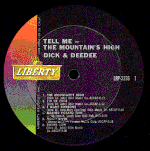 On to the Liberty Album Discography, Part 1
On to the Liberty Album Discography, Part 1
Regular LPs in the
3000/7000, 11000, 27000, and 35000 series (1955-1971)
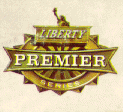 On to the Liberty Album Discography, Part 2
On to the Liberty Album Discography, Part 2
13000/14000
Premier Series (1960-1970)
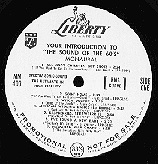 On to the Liberty Album Discography, Part 3
On to the Liberty Album Discography, Part 3
Miscellaneous
additional series
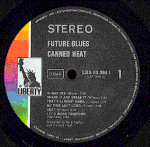 On to the Liberty Album Discography, Part 4
On to the Liberty Album Discography, Part 4
Related
Records
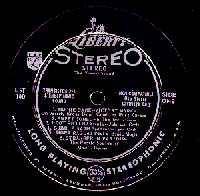 On to the Liberty Album Discography, Part 5
On to the Liberty Album Discography, Part 5
Early Stereo
Release Stereo/Mono Cross-Reference
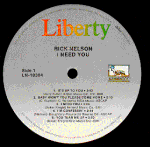 On to the Liberty Album Discography, Part 6
On to the Liberty Album Discography, Part 6
1970s/80s
Reissues
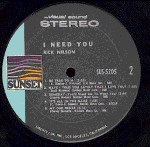 On to the Sunset Label Discography
On to the Sunset Label Discography
Liberty subsidiary label
(1966-1970)
 Back to the Discography Listings Page
Back to the Discography Listings Page
 Back to the Both Sides Now Home Page
Back to the Both Sides Now Home Page
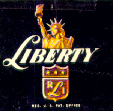 The Liberty Records Story
The Liberty Records Story Waronker contacted jazz artist Bobby Troup in 1955 to try to sign him to the label, but Troup was still
under contract to another record company. Troup, however, talked Si into signing his girlfriend, Julie
London. Julie became the "Liberty Girl" as she immediately had a hit with "Cry Me a River" (Liberty
55006, 1955) and went on to make a string of successful albums for the label. Troup himself did sign
with Liberty a short time later, and recorded a series of albums for Waronker.
Waronker contacted jazz artist Bobby Troup in 1955 to try to sign him to the label, but Troup was still
under contract to another record company. Troup, however, talked Si into signing his girlfriend, Julie
London. Julie became the "Liberty Girl" as she immediately had a hit with "Cry Me a River" (Liberty
55006, 1955) and went on to make a string of successful albums for the label. Troup himself did sign
with Liberty a short time later, and recorded a series of albums for Waronker.
 Ross Bagdasarian had been a songwriter of some success (for example, he wrote Rosemary Clooney's
1951 hit "Come On-A My House") when Liberty signed him in 1956. He first recorded under the name
"Alfi and Harry" ("The Trouble With Harry," Liberty 55008, 1956), an artist by-line obviously constructed
for the record itself. His followup single was "The Bold and the Brave"/"See a Teardrop Fall" under his
own name (Liberty 55013), but it disappeared without a trace. A quick reverting to Alfi and Harry
("Persian on Excursion"/"Word Game Song," Liberty 55016) didn't do much either. Seeking a simpler
pseudonym (for obvious reasons), Bagdasarian then recorded the instrumental "Armen's Theme"under
the name David Seville (Liberty 55041, 1956). He soon shifted to novelty records, with a few chart
successes within the next few years such as "Gotta Get to Your House" (Liberty 55079, 1957), "The Bird
On My Head" (Liberty 55140, 1958), "Little Brass Band" (Liberty 55153, 1958), and "Judy" (Liberty
55193, 1959). But these minor hits would have ensured Seville a brief but forgettable career if not for a
bit of innovation that landed him on the top of the charts. In 1958 he got the idea of speeding up the tape
of the human voice to create funny voices, and he had a number one record with the classic "Witch
Doctor" (Liberty 55132). He followed that up with "The Chipmunk Song" in late 1958 (Liberty 55168),
and then a long running series of albums and singles by Chipmunks "Alvin, Simon and Theodore." The
Chipmunks were wryly named for Liberty executives Alvin Bennett, Simon Waronker, and Theodore
Keep. Bagdasarian died in 1972, but his son, Ross, Jr., resurrected the Chipmunks act in the 1980s for a
whole new generation of fans both on record and in cartoons.
Ross Bagdasarian had been a songwriter of some success (for example, he wrote Rosemary Clooney's
1951 hit "Come On-A My House") when Liberty signed him in 1956. He first recorded under the name
"Alfi and Harry" ("The Trouble With Harry," Liberty 55008, 1956), an artist by-line obviously constructed
for the record itself. His followup single was "The Bold and the Brave"/"See a Teardrop Fall" under his
own name (Liberty 55013), but it disappeared without a trace. A quick reverting to Alfi and Harry
("Persian on Excursion"/"Word Game Song," Liberty 55016) didn't do much either. Seeking a simpler
pseudonym (for obvious reasons), Bagdasarian then recorded the instrumental "Armen's Theme"under
the name David Seville (Liberty 55041, 1956). He soon shifted to novelty records, with a few chart
successes within the next few years such as "Gotta Get to Your House" (Liberty 55079, 1957), "The Bird
On My Head" (Liberty 55140, 1958), "Little Brass Band" (Liberty 55153, 1958), and "Judy" (Liberty
55193, 1959). But these minor hits would have ensured Seville a brief but forgettable career if not for a
bit of innovation that landed him on the top of the charts. In 1958 he got the idea of speeding up the tape
of the human voice to create funny voices, and he had a number one record with the classic "Witch
Doctor" (Liberty 55132). He followed that up with "The Chipmunk Song" in late 1958 (Liberty 55168),
and then a long running series of albums and singles by Chipmunks "Alvin, Simon and Theodore." The
Chipmunks were wryly named for Liberty executives Alvin Bennett, Simon Waronker, and Theodore
Keep. Bagdasarian died in 1972, but his son, Ross, Jr., resurrected the Chipmunks act in the 1980s for a
whole new generation of fans both on record and in cartoons.
 The biggest early rock and roll artist for Liberty was Eddie Cochran. Cochran's first hit for the label was
"Sittin' in the Balcony" (Liberty 55056) in 1957, a "cover" or competing copy of a record on a small North
Carolina-based label by fledgling singer-songwriter John D. Loudermilk (recording as "Johnny Dee" on
Colonial 430). The song copied Loudermilk's style, and was not representative of Cochran's usual sound
or style. In fact, in 1957 it was difficult to say Cochran had a "style" at all as yet. He had made some
recordings with (unrelated) Hank Cochran in the rockabilly vein, but it wasn't until a year or so later that
he hit his stride with the rock and roll anthem "Summertime Blues" (Liberty 55144). He followed that up
with the pounding rocker "C'mon Everybody" (Liberty 55144). Such are the material of rock and roll
legends. Then came the dreaded "lull." By the time Cochran was tragically killed in an automobile
accident in England in 1960, he had failed to reach the top 40 for more than a year, although he was still
very popular as a stage act. Ironically, he has become much more popular and collectable since his
death than he ever was in life. Only one album, Singin' To My Baby, was issued on Liberty prior
to his death and it is very collectable. Two albums, Eddie Cochran: 12 of his Biggest Hits and
Never to Be Forgotten, were released after his death.
The biggest early rock and roll artist for Liberty was Eddie Cochran. Cochran's first hit for the label was
"Sittin' in the Balcony" (Liberty 55056) in 1957, a "cover" or competing copy of a record on a small North
Carolina-based label by fledgling singer-songwriter John D. Loudermilk (recording as "Johnny Dee" on
Colonial 430). The song copied Loudermilk's style, and was not representative of Cochran's usual sound
or style. In fact, in 1957 it was difficult to say Cochran had a "style" at all as yet. He had made some
recordings with (unrelated) Hank Cochran in the rockabilly vein, but it wasn't until a year or so later that
he hit his stride with the rock and roll anthem "Summertime Blues" (Liberty 55144). He followed that up
with the pounding rocker "C'mon Everybody" (Liberty 55144). Such are the material of rock and roll
legends. Then came the dreaded "lull." By the time Cochran was tragically killed in an automobile
accident in England in 1960, he had failed to reach the top 40 for more than a year, although he was still
very popular as a stage act. Ironically, he has become much more popular and collectable since his
death than he ever was in life. Only one album, Singin' To My Baby, was issued on Liberty prior
to his death and it is very collectable. Two albums, Eddie Cochran: 12 of his Biggest Hits and
Never to Be Forgotten, were released after his death.
 Billy Ward and his Dominoes had long been an R&B fixture when they signed with Liberty in 1957. The
landmark group had started in 1950 with lead singer Clyde McPhatter (Ward on piano), and in 1951 had
achieved the unprecedented feat of having an R&B hit that was so huge that it crossed over into the pop
charts. "Sixty Minute Man" (Federal 12022) spent 14 weeks on top of the R&B charts, and in late
summer, 1951, pushed its way into the pop top 20. When McPhatter left to form his own group, the
Drifters, in 1953, another lead singer of uncommon talent, Jackie Wilson, stepped in. By 1956, Ward's
group were "drifters" themselves, drifting from the harder R&B sound towards the more lush pop sounds
of orchestral music. When they signed in 1957, their previous hit had been "St. Therese of the Roses"
(Decca 29933), which featured Jackie Wilson backed with Jack Pleis' orchestra. At this point, Wilson
opted for rock and roll, and Ward's Dominoes continued toward orchestral pop. Ward hit with old pop
standards "Star Dust" (Liberty 55071, #12 pop, 1957) and "Deep Purple" (Liberty 55099, #20 pop, 1957)
right away, but it was the beginning of the end for the group. Their three Liberty albums, however, are
collectable. Wilson's replacement, Eugene Mumford, also put out several later singles on Liberty.
Billy Ward and his Dominoes had long been an R&B fixture when they signed with Liberty in 1957. The
landmark group had started in 1950 with lead singer Clyde McPhatter (Ward on piano), and in 1951 had
achieved the unprecedented feat of having an R&B hit that was so huge that it crossed over into the pop
charts. "Sixty Minute Man" (Federal 12022) spent 14 weeks on top of the R&B charts, and in late
summer, 1951, pushed its way into the pop top 20. When McPhatter left to form his own group, the
Drifters, in 1953, another lead singer of uncommon talent, Jackie Wilson, stepped in. By 1956, Ward's
group were "drifters" themselves, drifting from the harder R&B sound towards the more lush pop sounds
of orchestral music. When they signed in 1957, their previous hit had been "St. Therese of the Roses"
(Decca 29933), which featured Jackie Wilson backed with Jack Pleis' orchestra. At this point, Wilson
opted for rock and roll, and Ward's Dominoes continued toward orchestral pop. Ward hit with old pop
standards "Star Dust" (Liberty 55071, #12 pop, 1957) and "Deep Purple" (Liberty 55099, #20 pop, 1957)
right away, but it was the beginning of the end for the group. Their three Liberty albums, however, are
collectable. Wilson's replacement, Eugene Mumford, also put out several later singles on Liberty.
 Bandleader Martin Denny came to Liberty in 1957. When Liberty had an unexpected hit with Martin
Denny's "Quiet Village" (Liberty 55162) in 1959, a recording that had all sorts of "jungle sound effects", it
started Liberty on a seemingly endless number of exotic music albums by Denny and others. "Quiet
Village" itself, a remake of the 1952 Les Baxter tune (Capitol 2225), had been recorded in 1957 for an
earlier album (Exotica) in mono, and when the song became a huge hit, Liberty re-recorded it in
stereo for their stereo albums and juke box stereo singles. One of the members of Denny's band, Julius
Wechter, later started the Baja Marimba Band and had a number of hits for Herb Alpert's A&M label in
the
1960s.
Bandleader Martin Denny came to Liberty in 1957. When Liberty had an unexpected hit with Martin
Denny's "Quiet Village" (Liberty 55162) in 1959, a recording that had all sorts of "jungle sound effects", it
started Liberty on a seemingly endless number of exotic music albums by Denny and others. "Quiet
Village" itself, a remake of the 1952 Les Baxter tune (Capitol 2225), had been recorded in 1957 for an
earlier album (Exotica) in mono, and when the song became a huge hit, Liberty re-recorded it in
stereo for their stereo albums and juke box stereo singles. One of the members of Denny's band, Julius
Wechter, later started the Baja Marimba Band and had a number of hits for Herb Alpert's A&M label in
the
1960s.
 Another interesting, but unsuccessful, artist on Liberty was Texas deejay Willie Nelson. Starting in 1961
with "The Part Where I Cry"/"Mr. Record Man" (Liberty 55386), Nelson wrote songs and occasionally
recorded albums for
Liberty until 1964. His songs from this period have become country standards, including "Hello Walls,"
"Crazy," and "Funny How Time Slips Away." Listening to the Liberty recordings from the present,
however, is somewhat of a shock, as Nelson's voice was fairly clear and lacked the gravel heard in later
years. Whether that made a difference is unknowable, but his singles didn't do much until 1962, when
"Willingly" (Liberty 55403), a duet with Shirley Collie, cracked the Country top-10. A few more country
hits later, he left Liberty for RCA. Although he had a number of hits with RCA in the late 1960s, it wasn't
until the 1970s that Nelson became a superstar in the country field. (A 1958 Liberty single, Liberty
55155, "Susie"/"No Dough" by Willy Nelson, was actually a recording by the cousin of teen idol Ricky
Nelson, not the later country superstar.)
Another interesting, but unsuccessful, artist on Liberty was Texas deejay Willie Nelson. Starting in 1961
with "The Part Where I Cry"/"Mr. Record Man" (Liberty 55386), Nelson wrote songs and occasionally
recorded albums for
Liberty until 1964. His songs from this period have become country standards, including "Hello Walls,"
"Crazy," and "Funny How Time Slips Away." Listening to the Liberty recordings from the present,
however, is somewhat of a shock, as Nelson's voice was fairly clear and lacked the gravel heard in later
years. Whether that made a difference is unknowable, but his singles didn't do much until 1962, when
"Willingly" (Liberty 55403), a duet with Shirley Collie, cracked the Country top-10. A few more country
hits later, he left Liberty for RCA. Although he had a number of hits with RCA in the late 1960s, it wasn't
until the 1970s that Nelson became a superstar in the country field. (A 1958 Liberty single, Liberty
55155, "Susie"/"No Dough" by Willy Nelson, was actually a recording by the cousin of teen idol Ricky
Nelson, not the later country superstar.)
 The most consistent hit maker for Liberty in the early 1960s was Bobby Vee (Robert Velline). Vee was
from Fargo North Dakota, and in 1959 was a member of a local group called the Shadows (which
included Bob's brother and two of their friends). On February 3, 1959 when Buddy Holly, the Big Bopper
and Ritchie Valens were killed in a plane crash on their way to Fargo, the Shadows were asked to fill in
at the scheduled show. Contrary to persistent rumors, Bobby and his band did not sing any Buddy Holly
songs that evening out of respect for the late singer, but the audience loved him. Bobby Vee and
the Shadows had been recording for the Minneapolis-based Soma label, and a few months later had a
#1 regional hit with "Suzy Baby" (Soma 1110). Joe Sadd, a Liberty promotion man for the area, sent the
record to Snuff Garrett, who was then a hungry new producer for Liberty looking for talent. Garrett
arranged to buy the master and reissue it on Liberty (Liberty 55208), and to sign Vee to Liberty,
sans the Shadows. In the summer of 1960 he had his first top-10 national hit with "Devil or
Angel" (Liberty 55270), a remake of the 1956 Clovers R&B hit (Atlantic 1083). In July, 1961, he
recorded the Carole King and Gerry Goffin tune "Take Good Care of My Baby" (Liberty 55354), which
made #1. Bobby Vee had a long list of hits into the late 1960s and had over 20 albums issued on
Liberty.
The most consistent hit maker for Liberty in the early 1960s was Bobby Vee (Robert Velline). Vee was
from Fargo North Dakota, and in 1959 was a member of a local group called the Shadows (which
included Bob's brother and two of their friends). On February 3, 1959 when Buddy Holly, the Big Bopper
and Ritchie Valens were killed in a plane crash on their way to Fargo, the Shadows were asked to fill in
at the scheduled show. Contrary to persistent rumors, Bobby and his band did not sing any Buddy Holly
songs that evening out of respect for the late singer, but the audience loved him. Bobby Vee and
the Shadows had been recording for the Minneapolis-based Soma label, and a few months later had a
#1 regional hit with "Suzy Baby" (Soma 1110). Joe Sadd, a Liberty promotion man for the area, sent the
record to Snuff Garrett, who was then a hungry new producer for Liberty looking for talent. Garrett
arranged to buy the master and reissue it on Liberty (Liberty 55208), and to sign Vee to Liberty,
sans the Shadows. In the summer of 1960 he had his first top-10 national hit with "Devil or
Angel" (Liberty 55270), a remake of the 1956 Clovers R&B hit (Atlantic 1083). In July, 1961, he
recorded the Carole King and Gerry Goffin tune "Take Good Care of My Baby" (Liberty 55354), which
made #1. Bobby Vee had a long list of hits into the late 1960s and had over 20 albums issued on
Liberty.
 In 1962, Liberty signed Jan and Dean to their first contract with a major record label. They had some
hits dating back to 1958 for Arwin, a label owned by Marty Melcher (Doris Day's husband and Terry
Melcher's father), Herb Newman's Dore label, and Challenge Records. These included "Jennie Lee"
(Arwin 108, by Jan & Arnie, 1958, #8), "Baby Talk" (Dore 522, 1959, #10) and "Heart and Soul"
(Challenge 9111, 1961, #25). Jan and Dean came to Liberty just as surf and hot rod music were gaining
popularity, most successfully by their friends the Beach Boys. Jan and Dean jumped on the craze. In the
summer of 1963, they had a Number 1 hit with "Surf City" (Liberty 55580), written for them by Beach Boy
leader Brian Wilson. They followed up with several car song hits, including "Drag City" (Liberty 55641,
#10), "Dead Man's Curve" (Liberty 55672, #8) and "The Little Old Lady From Pasadena" (Liberty 55704,
#3). The hits spawned successful albums for the label well into 1966. But on April 19, 1966, Jan Berry
was involved in a very serious automobile accident and suffered critical injuries which pretty much ended
the duo's career.
In 1962, Liberty signed Jan and Dean to their first contract with a major record label. They had some
hits dating back to 1958 for Arwin, a label owned by Marty Melcher (Doris Day's husband and Terry
Melcher's father), Herb Newman's Dore label, and Challenge Records. These included "Jennie Lee"
(Arwin 108, by Jan & Arnie, 1958, #8), "Baby Talk" (Dore 522, 1959, #10) and "Heart and Soul"
(Challenge 9111, 1961, #25). Jan and Dean came to Liberty just as surf and hot rod music were gaining
popularity, most successfully by their friends the Beach Boys. Jan and Dean jumped on the craze. In the
summer of 1963, they had a Number 1 hit with "Surf City" (Liberty 55580), written for them by Beach Boy
leader Brian Wilson. They followed up with several car song hits, including "Drag City" (Liberty 55641,
#10), "Dead Man's Curve" (Liberty 55672, #8) and "The Little Old Lady From Pasadena" (Liberty 55704,
#3). The hits spawned successful albums for the label well into 1966. But on April 19, 1966, Jan Berry
was involved in a very serious automobile accident and suffered critical injuries which pretty much ended
the duo's career.
 On to the Liberty Album Discography, Part 1
On to the Liberty Album Discography, Part 1  On to the Liberty Album Discography, Part 2
On to the Liberty Album Discography, Part 2  On to the Liberty Album Discography, Part 3
On to the Liberty Album Discography, Part 3  On to the Liberty Album Discography, Part 4
On to the Liberty Album Discography, Part 4  On to the Liberty Album Discography, Part 5
On to the Liberty Album Discography, Part 5  On to the Liberty Album Discography, Part 6
On to the Liberty Album Discography, Part 6  On to the Sunset Label Discography
On to the Sunset Label Discography  Back to the Discography Listings Page
Back to the Discography Listings Page  Back to the Both Sides Now Home Page
Back to the Both Sides Now Home Page